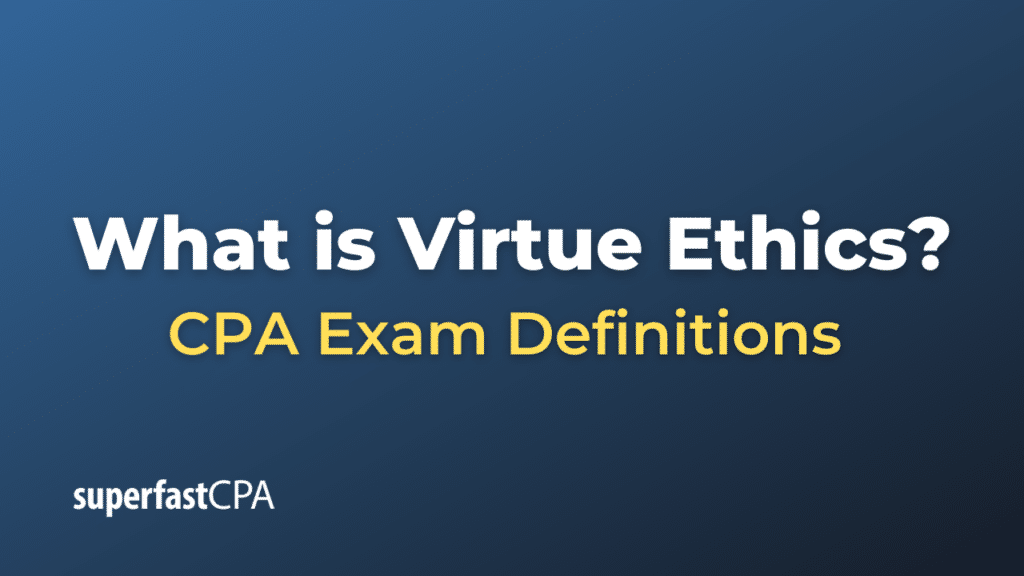Virtue Ethics
Virtue ethics in accounting applies the principles of virtue ethics to the practice of accounting. Unlike rule-based approaches that focus solely on adherence to professional codes of conduct or laws, a virtue ethics perspective emphasizes the character of the individual accountant as crucial for ethical accounting practice. Here, the focus is on cultivating virtues like honesty, integrity, courage, and practical wisdom in the accountant to ensure that they not only follow rules but also excel in ethical reasoning and moral character.
Key Points:
- Integrity: This virtue is of particular importance in accounting, where accuracy and truthful presentation of financial information are crucial. An accountant with integrity will not manipulate numbers or engage in deceptive practices, even when under pressure to do so.
- Confidentiality: Accountants often have access to sensitive information. The virtue of discretion or confidentiality is essential in ensuring that such information is not misused for personal gain or disclosed inappropriately.
- Professional Competence: The virtue of professional competence is tied to the commitment to continuous learning and the accurate application of accounting principles.
- Courage: Accountants may face pressure from stakeholders to manipulate financial reports or overlook irregularities. Courage is a vital virtue that enables them to resist such pressures and uphold ethical standards.
- Practical Wisdom: This involves knowing the right course of action in complex situations that are not clearly addressed by rules or guidelines. An accountant with practical wisdom would be skilled at applying general ethical principles to specific situations.
- Responsibility: The virtue of responsibility in accounting includes being accountable for one’s actions and taking corrective measures when mistakes occur.
- Humility: An understanding that one can always make mistakes or improve helps accountants seek peer reviews and maintain a willingness to correct errors, exemplifying the virtue of humility.
- Community Focus: Virtue ethics also encourages accountants to consider the broader impact of their actions on the community and the public interest, reinforcing virtues like justice and benevolence.
Example of Virtue Ethics
Let’s explore a fictional example to illustrate how virtue ethics would operate in an accounting context.
Scenario: Questionable Expense Report
Imagine you’re an accountant responsible for auditing expense reports in a medium-sized company. You come across an expense report from a high-ranking executive who is also a friend. The report includes ambiguous items that could be either personal or business-related. Your friend assures you they are valid business expenses but provides no supporting documentation.
Rule-based Approach:
A strictly rule-based approach would dictate that without supporting documentation, you should reject the ambiguous expenses. It might also require you to report the situation due to the high rank of the executive involved.
Consequentialist Approach:
A consequentialist might weigh the outcomes: the harm to your friendship and potential repercussions on your career versus the financial loss to the company and the ethical implications of approving an incorrect report.
Virtue Ethics Approach:
Here’s how virtue ethics would guide your decision-making:
- Integrity: The virtue of integrity would prompt you to treat this expense report like any other, despite the executive’s high rank and personal relationship with you.
- Courage: It may be uncomfortable or even risky to question a high-ranking executive’s expenses, but the virtue of courage would encourage you to do what’s ethically right despite the potential fallout.
- Practical Wisdom: This virtue helps you navigate the gray areas not explicitly covered by rules. In this situation, practical wisdom might lead you to ask for more context or evidence to support the ambiguous expenses before making a judgment.
- Professional Competence: Your competence in your role demands that you uphold the standards of your profession, which in this case would include verifying the legitimacy of expenses.
- Responsibility and Accountability: These virtues would remind you that you have a duty to your organization to ensure accurate and ethical financial reporting.
- Confidentiality: Despite the dilemma involving a friend, the virtue of confidentiality would guide you not to disclose sensitive information inappropriately.
- Humility: Acknowledging that this is a difficult decision and that you could make a mistake encourages you to consult the ethical guidelines of your profession or seek advice from a trusted colleague.
Based on these virtues, you might decide to approach the executive and request additional documentation or justification for the ambiguous items. If the executive cannot provide this, you might decide to reject those items from the expense report, adhering to your professional and ethical responsibilities.
In this example, the focus isn’t just on what you should do, but on what kind of professional you aim to be. You’re not just following rules or calculating outcomes; you’re acting in a way that cultivates virtues and builds your character as an ethical accountant.













